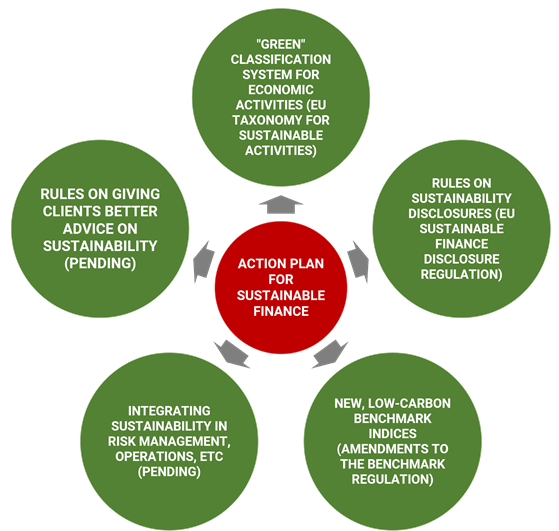Tough New Sustainability Rules Are Here – Is Your Company Ready?
On March 10, 2021, the EU Sustainable Finance Disclosure Regulation (SFDR) came into force. The SFDR – which forms part of the broader EU action plan for sustainable finance – is aimed at promoting disclosures related to sustainability issues. The overall goal is to enable investors to compare the sustainability characteristics of different financial products. Under the SFDR, financial market participants have to ensure that they integrate sustainability risks into their investment processes and inform customers of the sustainability-related details of their products. What do the new rules mean for financial professionals day-to-day?
Financial professionals and companies must comply with several of the key provisions of the SFDR, including mandatory disclosures around a host of sustainability-related issues. Some businesses, however, are struggling to understand the new rules.
Towards sustainable finance
The SFDR is a core element of the EU action plan for sustainable finance, an ambitious set of current and forthcoming regulatory measures aimed at encouraging the financial services sector to support the transition to a sustainable model of economic growth (see graphic below).

Irish Funds. European Union Action Plan on Sustainable Finance: Disclosures Regulation. November 2019.
At its heart, the SFDR is about helping investors pursue socially responsible investment strategies that consider not only financial but also environmental, social, and governance (ESG) factors. The SFDR is intended to make it easier for investors to understand the ESG qualities of the products available to them so that they can make informed investment choices.
The SFDR: Who does it apply to and what does it do?
The SFDR has two related objectives:
- To provide rules for financial market participants and financial advisors on transparency around the integration of sustainability risks and the consideration of adverse sustainability impacts in their processes
- To provide rules on the provision of sustainability‐related information about financial products
The SFDR applies to financial market participants (FMPs) – professional players in financial markets such as pension funds, asset managers, banks, venture capital funds, and insurance companies – and financial advisors (FAs), defined as almost anyone who provides investment advice or insurance advice related to insurance‐based investment products (IBIPs).
Broadly speaking, the SFDR requires FMPs and FAs to integrate sustainability risks in their products and processes and to disclose information related to those risks and practices to investors. Per the regulation, a sustainability risk is “an environmental, social, or governance event or condition that, if it occurs, could cause an actual or a potential material negative impact on the value of an investment.”
There are many specific disclosure requirements under the new rules, including the requirement that:
- Financial products must provide disclosures in pre-contractual documents on how they integrate sustainability risks and how those risks may affect returns
- FMPs and FAs must publish information on their websites about their policies for integrating sustainability risks into their investment decisions (FMPs) or investment/insurance advice (FAs)
- FMPs and FAs must provide information on their websites about how their remuneration policies are consistent with integrating sustainability risks at a firm and product level
- Sustainable and “green” financial products must disclose, among other things, what makes them “sustainable” and how they have achieved any relevant sustainability goals such as carbon emissions reduction – these disclosures should be made in pre-contractual information and periodic reports
- FMPs and FAs must provide information about their policies related to Principal Adverse Impacts (PAIs) – key ESG issues that all firms must to consider in their investment processes and decisions

Complexity & confusion
Although the rules come into force in March, there is still some confusion among firms over what is required, particularly around PAIs.
One key issue is that the Regulatory Technical Standards (RTS) that will underpin the regulation have not yet been fully finalized. A final draft of the relevant RTS was published in early February, but European authorities have proposed that their full implementation be delayed until January 1, 2022, to give firms the opportunity to prepare. However, this leaves companies facing some gaps as they try to implement the SFDR in March.
Another key issue has to do with the availability of ESG data. The SFDR requires FMPs and FAs to provide a great deal of ESG-related information that is currently not made publicly available by the companies that they invest in. This puts financial firms in a challenging position.
Although some firms and financial professionals have concerns around the implementation of the SFDR, advocates of sustainable investing have generally been positive about the new regulation. They hope that, by focusing attention on sustainability risks, the regulation will encourage both investors and financial professionals to take such risks seriously and integrate them into their decision-making.
Intuition Know-How has a number of tutorials that are relevant to sustainability, ESG, and responsible investing:
- ESG & SRI – Primer
- ESG & SRI – An Introduction
- ESG & SRI – Investing
- ESG Factors
- SRI Strategies
- ESG & SRI Reporting
- Green Assets
- ESG & SRI Scenario – Retail
- ESG & SRI Scenario – Institutional
- Sustainable Finance Disclosure Regulation (SFDR) (Coming Soon)
- Corporate Social Responsibility (CSR)


